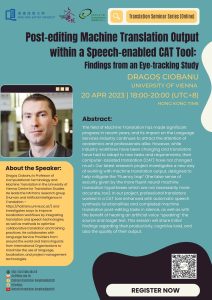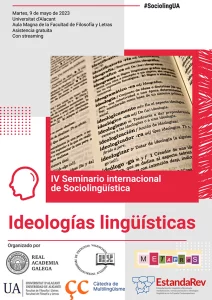Once a month, the Translation Studies Reading Group of the Trinity Centre for Literary & Cultural Translation comes together to discuss an article recently published in a Translation Studies journal.
The group is free and open to anyone in the world to join in with, irrespective of academic level or affiliation. All you need to do is read the article before the group meets and sign up. Everyone is encouraged to join in with the conversation and add their own viewpoints. We are not able to send the articles to people who do not have access to them.
The details of the article we will read for this month’s Reading Group are below. Please follow the link for access to the full article.
Anthony Pym
Who says who interprets? On the possible existence of an interpreter system
If we ask who is selected to interpret in a particular setting, who is most trusted, the answers rarely concern interpreting as an independent social system. Different legal systems decide whom they trust as translators; institutional employers carry out their own exams; education systems provide signals of competence; the systems of controlled knowledge (science) and its diffusion (news) tend to rely on their own members who ‘know languages’ and, as has been seen in the case of pandemic-related information, rarely display constant trust in wholly independent interpreters. Analysis of interpreters’ trustworthiness in terms of Luhmann’s sociology can thus start from dependencies between at least four possible types of system: interpreters supply utterance; legal systems assume truthful utterance; education systems attest the relative trustworthiness of utterance; systems of knowledge control and diffusion (science, the military, government information, news) assume shared skills or ad hoc modes of professional hybridity. On this view, an interpreter system is only sometimes able to create its own signals of trustworthiness and have those signals accepted. In many instances, it must rely on intersystemic relations, which are often irritations ensuing from the way one social system is given to not understanding another.
https://www.tandfonline.com/doi/full/10.1080/13556509.2022.2083752
Qu’est-ce que l’écologie — en général et dans nos métiers ? Comment la traduction s’inscrit-elle dans l’écosystème de l’édition et de la production de contenus ? Comment adopter une démarche écologique dans son activité ? C’est entre autres à ces questions que répondra Marin Schaffner, traducteur et militant de l’écologie, lors d’une masterclass à destination des traducteurs et traductrices de tous secteurs.
Cette masterclass, organisée en partenariat avec l’université de Tours, se tiendra en mode hybride sur place à l’Université de Tours ou à distance sur la plateforme Teams.
Un enregistrement sera mis à la disposition des personnes inscrites dans les semaines qui suivront la masterclass.
Inscriptions (le tarif étudiant sur justificatif est gratuit)
JOURNEE D’ÉTUDE
LITTERATURE CATALANE CONTEMPORAINE
Écrivaines contemporaines d’expression catalane : les traduire en français et/ou en castillan
Escriptores contemporànies d’expressió catalana : traduir-les al francès i/o al castellà
ReSO (Université Paul-Valéry Montpellier 3) et GETLIHC (Universitat de Vic)
Organisatrices : Sandrine FRAYSSINHES RIBES, Caterina RIBA et Júlia ROCAS SUMOY
Speaker: Professor Dragoș Ciobanu
University of Vienna
Moderator:
Dr Nan ZHAO
Department of Translation, Interpreting and Intercultural Studies, Hong Kong Baptist University
Organizer:
Centre for Translation, Hong Kong Baptist University
Once a month, the Translation Studies Reading Group of the Trinity Centre for Literary & Cultural Translation comes together to discuss an article recently published in a Translation Studies journal.
The group is free and open to anyone in the world to join in with, irrespective of academic level or affiliation. All you need to do is read the article before the group meets and sign up. Everyone is encouraged to join in with the conversation and add their own viewpoints. We are not able to send the articles to people who do not have access to them.
The details of the article we will read for this month’s Reading Group are below. Please follow the link for access to the full article.
Pilar Ordóñez López & Rosa Agost
Future translatorsʼ views on translation theory: a qualitative approach
The practical orientation of undergraduate translation and interpreting degrees in Spain means that less importance is given to theoretical modules, and it is often thought that students doubt the usefulness of these modules and are therefore reluctant to take them. Previous empirical researchhas shown that students are not as averse to theory as is often assumed; in fact, according to these studies, students rate its contribution to their training quite positively. In order to take a further step in the study of students’ views on translation theory, the present study adds a qualitative perspective to (in)validate the results obtained in previous research and explore them in greater depth. Students’ answers to open questions are analysed using Atlas.ti qualitative analysis software to assess how translation theory contributes to their training and identify the strengths and weaknesses of the translation theory module at Jaume I University (Castellón, Spain). Our findings show that fitting translation theory into the training and education of translators is a complex task and they also reveal that cognitive restructuring is needed to help students overcome their tendency to associate theory with complex, dense, difficult-to-grasp and, ultimately, useless concepts.
El IV Seminario internacional de Sociolingüística tendrá lugar el 9 de mayo de 2023 en el Aula Magna de la Facultad de Filosofía y Letras de la Universitat d’Alacant y se retransmitirá gratuitamente por streaming desde esta dirección: https://si.ua.es/es/videostreaming/filosofia-y-letras.html
Las personas que asistan solamente en línea no podrán tener certificado de asistencia porque el programa no permite controlar la asistencia real.
En su canal de YouTube se pueden encontrar los vídeos de los seminarios anteriores:
I Seminario: https://youtube.com/playlist?list=PLsRZfy60RkwDK8Ot8miO1YqGLz2BPVFek
II Seminario: https://youtube.com/playlist?list=PLsRZfy60RkwCw6WKyPRxjVwAZ3eZmKZ7Z
III Seminario: https://www.youtube.com/watch?v=Ir1Jwg1Yt9o (por la mañana)
https://www.youtube.com/watch?v=3cQv_Qnx4X0 (por la tarde)
La XXVII edición del Premio Andreu Febrer de Traducción Literaria propone trabajar la traducción de poesía del siglo XIX y principios del XX.
El Premio está dirigido a estudiantes de grado y máster en Traducción e Interpretación, Lenguas Aplicadas, Filologías o disciplinas afines de cualquier facultad del Estado español, y la fecha límite para enviar candidaturas es el 15 de mayo de 2023.
Podéis consultar las bases y dirigiros a la secretaría del premio (premi.andreufebrer@uvic.cat) en caso de duda.
Once a month, the Translation Studies Reading Group of the Trinity Centre for Literary & Cultural Translation comes together to discuss an article recently published in a Translation Studies journal.
The group is free and open to anyone in the world to join in with, irrespective of academic level or affiliation. All you need to do is read the article before the group meets and sign up. Everyone is encouraged to join in with the conversation and add their own viewpoints. We are not able to send the articles to people who do not have access to them.
The details of the article we will read for this month’s Reading Group are below. Please follow the link for access to the full article.
Magdalena Oziemblewska & Agnieszka Szarkowska
The quality of templates in subtitling. A survey on current market practices and changing subtitler competences
The rapidly growing demand for subtitling on the global translation market has resulted in a new development which has revolutionised the way subtitles are created and distributed: the template. A template is a subtitle file containing a time-coded transcription of the dialogue to be later translated into multiple target languages. Loved by global subtitling companies and frowned upon by subtitlers, templates have become an inseparable part of modern subtitling workflows. The goal of our study is to examine this new development in terms of quality, its impact on the profession and the resulting changes in subtitler competences. With this goal in mind, we conducted an online survey which was completed by 344 professionals from 47 countries involved in the subtitling process with templates. We gathered data on the content of the templates, subtitling workflows, types of software, pivot translation, annotations, and language combinations. We found important differences in spotting skills between subtitlers depending on their experience and type of company they work for. Our results also show that the quality of templates currently available on the market is rather inadequate. We present suggestions for improvement based on the subtitlers’ views. The results may be used to inform current market practices.












